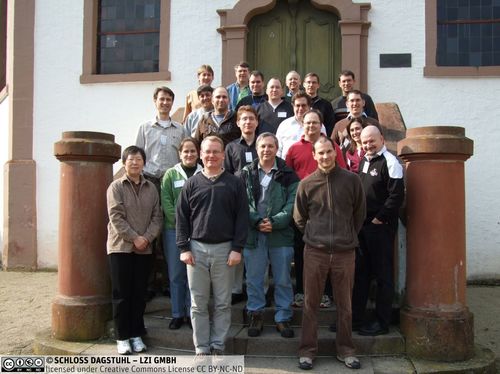Dagstuhl Perspectives Workshop 09102
Naming and Addressing in a Future Internet
( Mar 01 – Mar 04, 2009 )
Permalink
Organizers
- Jari Arkko (Ericsson - Jorvas, FI)
- Marcelo Bagnulo Braun (Univ. Carlos III - Madrid, ES)
- Scott Brim (CISCO Systems - Ithaca, US)
- Lars Eggert (NetApp Deutschland GmbH - Kirchheim, DE)
- Christian Vogt (Ericsson - San Jose, US)
- Lixia Zhang (UCLA, US)
Contact
- Annette Beyer (for administrative matters)
Schedule
The purpose of the perspectives workshop on naming and addressing in a future Internet was to generate input to the research and engineering community on how to evolve the Internet architecture forward in a way that satisfies the naming and addressing requirements of the existing and future Internet. The workshop brought together key researchers and engineers from the realm of Internet naming and addressing in an attempt to find a common understanding on preferred evolutions of the Internet architecture. The report summarizes the discussions
In the end, the participants came to agreement on a number of questions and were able to identify a number of challenges that need to be investigated in more detail.
Everyone agreed that a shared terminology definition is important going forward. Currently, even fundamental terms are used in different ways by different parties. For example, are locators IP addresses or something else? What exactly are identifiers and what do they identify? Are names only used at higher layers or do they serve a purpose at the network layer?
There are agreement on eliminating the overloading of identifiers, in particular IP addresses. There was disagreement on how many identifiers we need: node identifiers, stack identifiers, session identifiers?
We are still in the learning process regarding how to design an architecture. Technology advances and network growth happen continuously, which bring up new demands to the architecture that cannot be foreseen. Consequently, an architecture should have the flexibility to allow easy incremental changes. We expect the majority of Internet hosts to become mobile in the coming years. One foreseen impact on the architecture is that we need to somehow disentangle the semantic overload of IP addresses.
- Bengt Ahlgren (Swedish Institute of Computer Science - Kista, SE) [dblp]
- Jari Arkko (Ericsson - Jorvas, FI) [dblp]
- Marcelo Bagnulo Braun (Univ. Carlos III - Madrid, ES) [dblp]
- Roland Bless (KIT - Karlsruher Institut für Technologie, DE) [dblp]
- Scott Brim (CISCO Systems - Ithaca, US)
- Leslie Daigle (Internet Society - Reston, US) [dblp]
- Lars Eggert (NetApp Deutschland GmbH - Kirchheim, DE) [dblp]
- Kevin R. Fall (Carnegie Mellon University - Pittsburgh, US) [dblp]
- Bryan Ford (Yale University, US) [dblp]
- Paul Francis (MPI-SWS - Kaiserslautern, DE) [dblp]
- Andrei Gurtov (HIIT - Helsinki, FI) [dblp]
- Joel M. Halpern (Leesburg, US) [dblp]
- Tony Li (Redback Networks Inc. - San Jose, US)
- Michael Menth (Universität Tübingen, DE) [dblp]
- Raquel Morera (Telcordia Technologies - Piscataway, US) [dblp]
- Benno Overeinder (NLnet Labs - Amsterdam, NL)
- Phil Roberts (Internet Society - Reston, US)
- Javier Ubillos (Stockholm, SE)
- Christian Vogt (Ericsson - San Jose, US)
- Klaas Wierenga (CISCO Systems - Utrecht, NL)
- Lixia Zhang (UCLA, US) [dblp]


